
We kindly inform you that, as long as the subject affiliation of our 300.000+ articles is in progress, you might get unsufficient or no results on your third level or second level search. In this case, please broaden your search criteria.

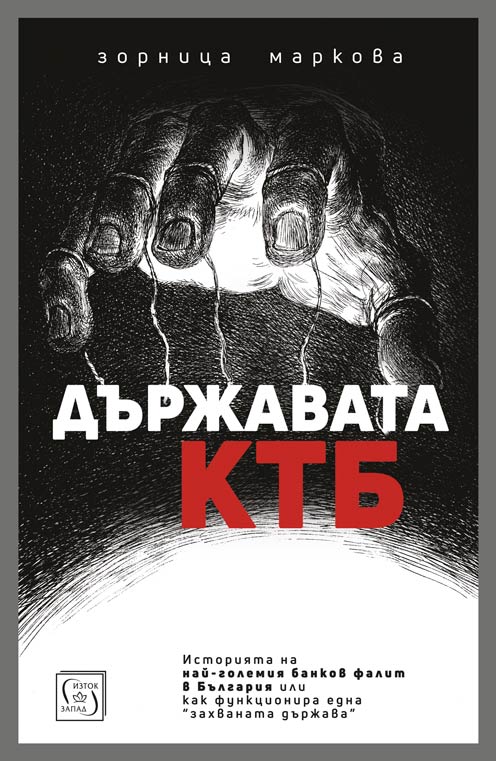
This book is the result of a two-year journalistic investigation that traces the history of Corporate Commercial Bank from its origin to its bankruptcy (1994-2014). The investigation was conducted on the basis of dozens of meetings with direct participants or witnesses of the events, representatives of state structures, political parties, business, regulators. In the process, hundreds of official and informal documents have been analyzed. Access to information by Bulgarian and international organizations has been requested many times. The collected facts, data, documents, and exclusive testimonies included in this book contain for the first time conclusive evidence of political corruption in Bulgaria. The aim of the KTBfiles project is to show the genesis of the "CCB model" (Corporate Commercial Bank model) and the technology of its expansion to magnitude, which pressed all key state institutions to the wall. The book explores the circumstances that made this vicious model possible, as well as the mechanisms for its eradication. This makes the investigation much more comprehensive, multi-layered and important than the chronology of bank bankruptcy, whether it is the largest in Bulgarian history. This qualitative journalistic investigation answers not only to the question #WHO but also to the questions how, why and especially what follows if we stop asking and live permanently with civil indifference and cynicism.
More...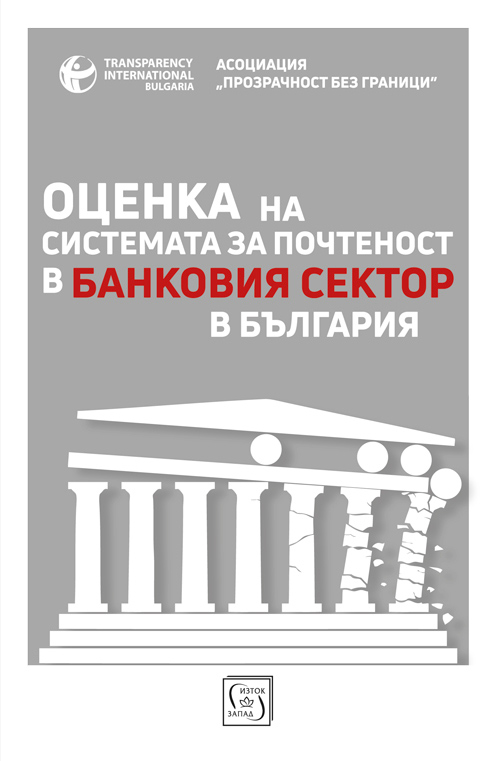
This study is provoked by one of the most significant cases of abuses over the last two decades in Bulgaria - the bankruptcy of CCB (Corporate Commercial Bank), the fourth largest bank in the country. After the 1996-1997 crisis, when one third of the banks went bankrupt, the country's banking sector collapsed. This is the second case in which huge financial resources "evaporated" and the negative consequences affected a wide range of public institutions and private subjects. The emergence of periodically recurring financial crises, with multiple impacts on public, economic and political life, motivates Transparency International Bulgaria to look for a systematic response to the problem and look beyond the specific case. The present book is based on the analytical approach of the international anti-corruption organization Transparency International "National Integrity System" which assesses clearly defined criteria, the capacity, functioning and management of sectors and institutions with key importance in counteracting corruption. The study is based on an analysis of the legislation and practical actions of the investigated institutions, a wide range of documentary sources, reports, assessments, media publications, and interviews with experts and public figures that have had direct observations and touch with the CCB case. It reflects an attempt to formulate an impartial, objective assessment of the functioning of the banking supervisory system in the 2009-2014 periods but also pursues another objective - to serve as a starting point for policies and strategic actions to give an adequate systemic response to established deficits. Viewed through this prism, this publication expresses the ambition of the Transparency International Bulgaria to not only prevent future crises of this nature, but also to contribute to the institutional strengthening of the system of supervisory institutions in Bulgaria.
More...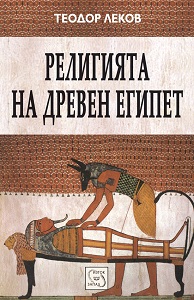
The book studies the Ancient Egyptian religion. The author describes the creation and its driving forces through the view of Egyptian concepts. The idea of God and the divine manifestations, the place of man in the world and the ways to achieve immortality are explored. The exposition is based on the study of ancient hieroglyphic texts and is illustrated with numerous examples. The book is intended for a wide range of readers who are interested in the religion and culture of Ancient Egypt. It contains three chapters: the world of gods, the creation of the world and the world of men. Special attention is paid on the concept of the kingship in Ancient Egypt. The Egyptian terminology and the names of gods and goddesses are formed as a dictionary at the еnd of the book.
More...
„The Prince” was written by Niccolo' Machiavelli in the 1500s. It has continued to be a best seller in many languages. The Prince is a classic book that explores the attainment, maintenance, and utilization of political power in the western world. Machiavelli wrote The Prince to demonstrate his skill in the art of the state, presenting advice on how a prince might acquire and hold power. Machiavelli defended the notion of rule by force rather than by law. Accordingly, The Prince seems to rationalize a number of actions done solely to perpetuate power. It is an examination of power-its attainment, development, and successful use.
More...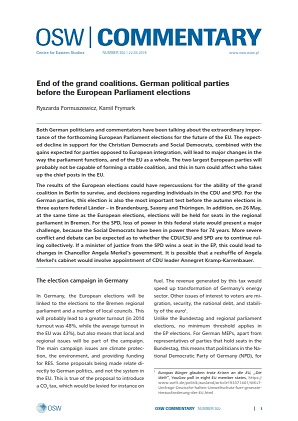
Both German politicians and commentators have been talking about the extraordinary importance of the forthcoming European Parliament elections for the future of the EU. The expected decline in support for the Christian Democrats and Social Democrats, combined with the gains expected for parties opposed to European integration, will lead to major changes in the way the parliament functions, and of the EU as a whole. The two largest European parties will probably not be capable of forming a stable coalition, and this in turn could affect who takes up the chief posts in the EU. The results of the European elections could have repercussions for the ability of the grand coalition in Berlin to survive, and decisions regarding individuals in the CDU and SPD. For the German parties, this election is also the most important test before the autumn elections in three eastern federal Länder – in Brandenburg, Saxony and Thüringen. In addition, on 26 May, at the same time as the European elections, elections will be held for seats in the regional parliament in Bremen. For the SPD, loss of power in this federal state would present a major challenge, because the Social Democrats have been in power there for 74 years. More severe conflict and debate can be expected as to whether the CDU/CSU and SPD are to continue ruling collectively. If a minister of justice from the SPD wins a seat in the EP, this could lead to changes in Chancellor Angela Merkel’s government. It is possible that a reshuffle of Angela Merkel’s cabinet would involve appointment of CDU leader Annegret Kramp-Karrenbauer.
More...
Zarówno niemieccy politycy, jak i komentatorzy wskazują na wyjątkowe znaczenie zbliżających się wyborów do Parlamentu Europejskiego dla przyszłości Unii Europejskiej. Prognozowany spadek poparcia dla chadecji i socjaldemokracji w połączeniu ze spodziewanym wzmocnieniem reprezentacji partii krytycznie nastawionych do integracji europejskiej skutkować będzie głębokimi zmianami w funkcjonowaniu parlamentu, a także UE jako całości. Dwie największe partie europejskie nie będą najprawdopodobniej w stanie same utworzyć stabilnej koalicji, co może też wpłynąć na obsadę głównych stanowisk w UE. Wynik wyborów do PE może wpłynąć na trwałość wielkiej koalicji w Berlinie oraz decyzje personalne w CDU i SPD. Dla niemieckich partii głosowanie to jest także najważniejszym testem przed jesiennymi wyborami w trzech wschodnich krajach związkowych – w Brandenburgii, Saksonii i Turyngii, a ponadto 26 maja wraz z wyborami do PE odbędą się wybory do parlamentu krajowego w Bremie. Dla SPD poważnym wyzwaniem byłaby utrata władzy w tym kraju związkowym, gdyż socjaldemokraci rządzą tam od 74 lat. Można się spodziewać zaostrzenia sporów i debaty o kontynuowaniu wspólnych rządów CDU/CSU i SPD. Zdobycie mandatu w PE przez minister sprawiedliwości z SPD może doprowadzić do zmian w gabinecie kanclerz Angeli Merkel. Niewykluczone, że na skutek rekonstrukcji rządu znajdzie się w nim przewodnicząca CDU Annegret Kramp-Karrenbauer.
More...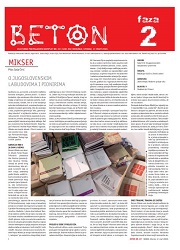
MIKSER, Saša Ćirić: O jugoslovenskim labudovima i pionirima; ŠTRAFTA Redakcija ULUS-a: Zimski radovi; ARMATURA, Jelena Veljić: Redovno pranje ruku; BLOK BR. V, Studiostrip: Primeri
More...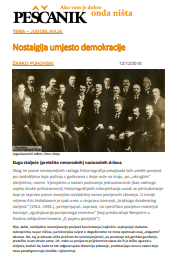
Zbog ne posve nerazumljivih razloga historiografija od vajkada teži urediti povijest po razdobljima koja počinju s godinama s dvije nule na kraju, po „okruglim“ stoljećima, naime. Vjerojatno u nakani postizanja jednostavnosti (kao važnoga uvjeta široke prihvaćenosti) historiografijskih interpretacija uvodi se periodiziranje koje je zapravo posve izvanjsko na vlastitoj naravi povijesnih zbivanja. U novije vrijeme Eric Hobsbawm je ipak uveo u raspravu koncept „kratkoga dvadesetog stoljeća“ (1914.-1991.), primjenjujući, zapravo, na specifičan povijesni materijal koncept „zgušnjavanja povijesnoga vremena“ (koji predznačuje Benjamin u životno zaključnim tezama „O pojmu povijesti“).
More...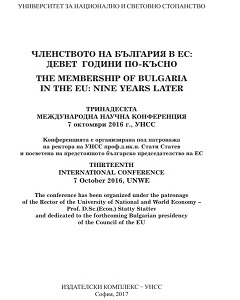
This book collects scientific papers and reports presented on the conference ‘The Membership of Bulgaria in the EU: Nine Years Later’ organized by the International Economic Relations and Business Department at University of National and World Economy (UNWE), Sofia, Bulgaria. The conference, held on 7 October 2016, was dedicated to the upcoming Bulgarian Presidency of the Council of the EU. The contributors to the present edition of the book explore topics such as European integration and Cohesion, the role of the financial centres in the EU, development in the banking sector, Banking union, Eurozone and inflation, financial risk mitigation. Researchers discuss some EU strategic goals such as the energy union and environmental policies, energy economics, electricity generation, energy markets and liberalization as well as research activities and initiatives such as the program Horizon 2020. Authors review aspects related to the organizational issues, change management, communication in organizations, business culture, corporate social responsibility, corporate governance, irregularities and financial corrections. The book contains in-depth research related to the innovations and outsourcing, digital marketing, regional financial sustainability in Bulgaria and analysis on the local tourism. ‘The Membership of Bulgaria in the EU: Nine Years Later’ is an annually organized academic event with the vision to foster open dialogue, offer contemporary research and exchange of ideas between fellow academics, policy makers, businesses, stakeholders and the public.
More...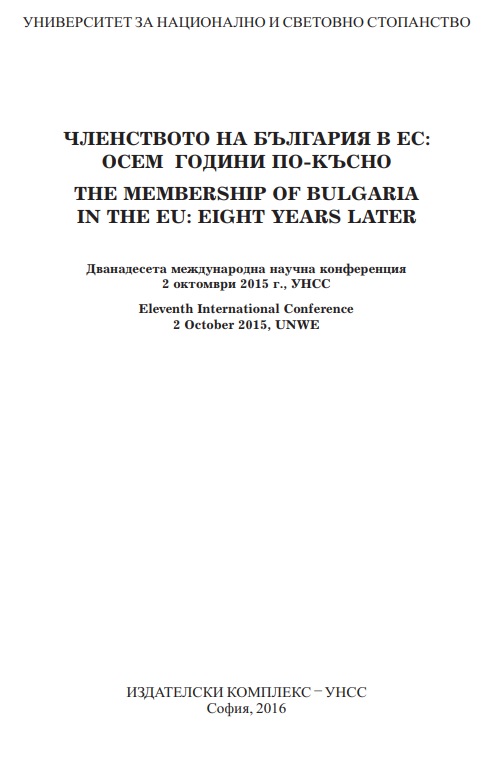
This book collects scientific papers and reports presented on the conference ‘The Membership of Bulgaria in the EU: Eight Years Later’ organized by the International Economic Relations and Business Department at University of National and World Economy (UNWE), Sofia, Bulgaria. The conference, held on 2 October 2015, traditionally provided a stage for prominent academics, dedicated PhD students and professionals to discuss contemporary topics related to multiple aspects of the European integration, its effects on the Bulgarian economy, value chain and socio-economic environment, international business and relations, financial markets and banking.The contributors to this edition of the annual conference book reviewed the European integration and development though the perspectives of the fiscal and political measures to tackle the consequences of the financial crisis in both the Euro area and the other EU member states, implications on the banking sector, foreign direct investment, risk mitigation. The financial crisis and the results in the aftermath of it (capital liquidity imbalances, fiscal instability, banking volatility, quantitative easings and Euro area performance indicators, to name a few) are dominating among the majority of authors’ research. The contributors review issues related to the corporate management, corporate governance, sustainable education, organizational design, digital marketing, ethical PR and media, talent development in large organizations. Another group of researchers offer in-depth reviews of the current EU institutional framework, emerging questions related to the energy security and the EU energy policy as well as the environment on a global level, healthcare and business innovations. ‘The Membership of Bulgaria in the EU: Eight Years Later’ is an annually organized academic event with the vision to foster open dialogue, offer contemporary research and exchange of ideas between fellow academics, policy makers, businesses, stakeholders and the public.
More...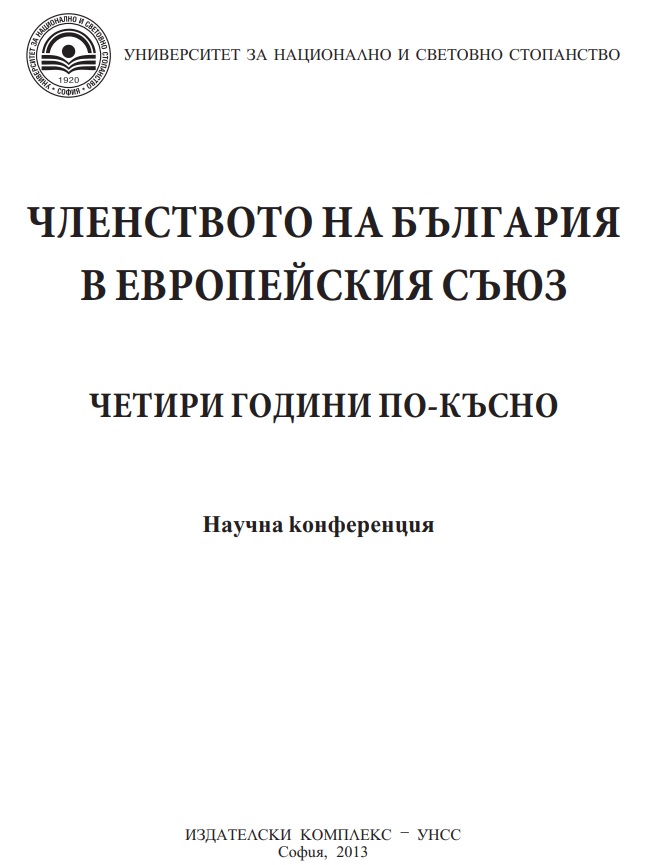
This book collects scientific papers and reports presented on the conference ‘The Membership of Bulgaria in the EU: Four Years Later’ organized by the International Economic Relations and Business Department at University of National and World Economy (UNWE), Sofia, Bulgaria. The conference, held on 3 October 2010, traditionally provided a stage for prominent academics, dedicated PhD students and professionals to discuss contemporary topics related to multiple aspects of the European integration, its effects on the Bulgarian economy, socio-economic environment, international business and relations, finance and politics.The conference was opened with a keynote speech by Meglena Kuneva who used to serve in the European Commission and is a prominent figure in the Bulgarian political life associated with the European integration process and accession to the European Union. She highlighted that the Bulgarian membership in the European Union is a rare example of widely shared national consensus in the past 22 years. Meglena Kuneva presented arguments in favour of this membership while noting challenges that remain unsolved years after our accession – we shall understand better the signs given by Brussels as well as put an emphasis on the human factors. Kuneva shared the view that commitment and high ethical and professional standards are required when appointments are made for the EU funds governance on a national level. We shall be more active towards EU in our contribution, she concluded. The participants in the conference presented research about the multiple effects on the Bulgarian economy as a result of the EU membership and access to the Single market. Authors discussed the international competitiveness of the Bulgarian export industry, they dedicated analysis on the Bulgarian trade with the other EU member states as well as industrial concentrations among the countries sharing single market. The liberalization of the telecommunications market in Bulgaria, reforms in the regulations of the pension funds and public procurement is among the topics presented. Another group of academics discussed current trends in the global economy, regional and global challenges to the EU. Those processes would have implications on the entire EU bloc. This could be related to the role of the Euro as an international currency as well as the development of the economic and monetary union (EMU) within EU. Contributors review topics related to the real and nominal convergence of Bulgaria and other countries in the EMU and the Bulgarian contribution and participation in key EU policies. Some authors present research on the challenges and achievements regarding the absorption of the EU funds in Bulgaria and implementation of the operating programs. Group of papers is dedicated to the international business environment, transnational organizations, international standardization through ISO, quality assurance and management, employees’ performance, and organizational culture. ‘The Membership of Bulgaria in the EU: Four Years Later’ is an annually organized academic event with the vision to foster open dialogue, offer contemporary research and exchange of ideas between fellow academics, policy makers, businesses, stakeholders and the public.
More...
Though the idea of toleration can be found as a virtue still in the classical authors of antiquity, the real centering of this topic as part of the political, philosophical and legal discourse of modern societies dates back actually to the Protestant revolution and the followed-up religious and political conflicts in Europe. In such a way the debate about toleration spread mainly on the idea of the political compliance, which means nothing but co-existence of groups of people, professing different kinds of religious beliefs. In this context not less important should also be the problem of where the religious differences really end, and where the differences based on the ethnic and cultural affiliation start. But even extended in this way the problem of toleration seen solely as based on differences arose as a result of the socio-historical evolution of separate groups of people, turns out to be only a special case of a larger and more general principle. This principle, to some extent, determined the accepted and legitimate state of the liberal-democratic societies in our days.
More...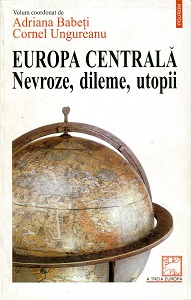
(...) Conceptul de națiune cunoaște două codificări principale: 1. definiția politică și legală formulată de enciclopediștii francezi, după care expresia fundamentală a națiunii este statul; 2. definiția elaborată de Herder, Schelling, frații Schlegel și îndeosebi de către Fichte, potrivit căreia națiunea e, în esență, o comunitate ancestrală determinată de factori precum limba și clima, iar nu o configurație politică. în ceea ce privește Europa de Est, nici una dintre aceste definiții nu a fost operantă : limitele care separau națiunea de societate sau de anumite grupuri sociale erau extrem de labile. Națiunea nu se bucura nici pe departe aici, la sfirșitul secolului al XVIII-lea, de interesul pe care îl suscita în Occident.
More...
În partea finală a memoriilor sale din 1925, dedicate războiului, T.G. Masaryk, după ce inventariase toate acele „noi” state răsărite pe harta continentului în urma primei conflagrații mondiale, insera una dintre puținele note de subsol al acestui fascinant și în același timp nedumeritor opuscul, un melanj de erudiție, politică, filosofie, teologie și reflecție personală. Tema notei de subsol era ambiguitatea conceptului de „Europă Centrală”.
More...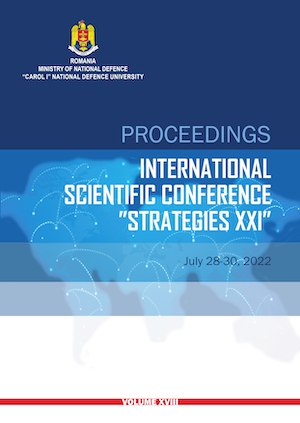
The present study aimed to make a diagnosis among the civilian population regarding the perception of confrontation with a limited situation represented by the possibility of an armed conflict in which the need to move in a safe area, far from the horrors of the war, is achieved in hostile weather conditions. Refugees are some of the most vulnerable people in the world, many have suffered on the way to a safer place, violence, losses and hunger, but in winter it beats relocated families are facing significant risks for their health. Providing by this study that the perception of civil and incompletely informed civilian persons regarding the movement, transport of weights and physical effort at low temperatures and unfavorable weather conditions can be an important factor that can be speculated. The study was conducted on a sample of 107 subjects, university customers, bachelor's degree. Before carrying out and applying the questionnaire, discussions were held with the study participants. The study method used was the questionnaire. The centralization of the results leads to the need to establish well-defined and realistic objectives, correlated with the real level of theoretical knowledge and physical capacities of the civilian population. The study shows a real challenge in terms of structuring a civilian training plan. The level of information on the risks that appear with the exposure to low temperatures over a longer period of time is minimal, the perception of the majority of the study being in a small correlation with the real capacities to bear low temperatures to carry moderate weights or to move.
More...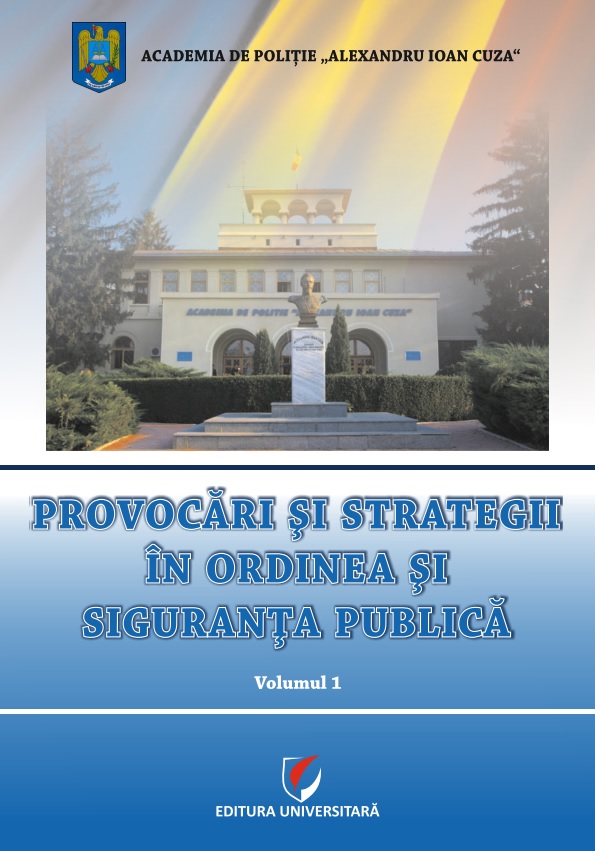
Conferința științifică internațională a Academiei de Poliție International Scientific Conference of Police Academy ,,Alexandru Ioan Cuza” Bucharest
More...
This paper analyses the political representation of youth in the Western Balkans and their participation in political parties, elections, intra-party quota systems, and whether the political parties find quotas as a best solution for increasing political participation of youth and their political credibility. The literature review of other countries that use youth quotas as inclusion-instruments to ensure a wider perspective on how youth political representation should look and where should it derive from is also presented Balkan countries did not institutionalize quota systems in their public institutions or introduced it as a criterion for the creation of election lists. However, most parties voluntarily include representatives of their youth wing organizations in their election lists. Nevertheless, there are very few successful outcomes of such practice where young candidates got elected and represented youth interests in high level institutions such as the Parliament. This comparative report shows that countries that used youth quotas faced similar problems, as the young candidates who got elected as the result of the implemented quota system often did not have proper political influence and they were influenced by their more experienced fellow party members. Aside from quotas, one of the final recommendations of this research is that political parties should introduce mechanisms of informal education that will provide knowledge and experience to young candidates so that they can handle better the situations that are likely to occur within the party and during election campaigns.
More...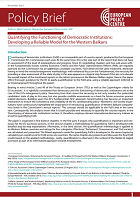
Functioning of democratic institutions (FoDI) is an inseparable part of country reports produced by the European Commission (EC, Commission) each year. At the same time, this is the sole part of the report that does not have an assessment of the level of preparedness and progress. Since 33 negotiating chapters and two sub-areas within the Fundamentals cluster, namely Economic Criteria and the Public Administration Reform (PAR), are regularly assessed by the Commission for all (potential) candidate countries, FoDI deserved the same treatment. Moreover having in mind the revised enlargement methodology with enhanced focus on the Fundamentals, the necessity for providing a clear assessment of the state of play in this area appears as a logical step forward if the aim is to elevate the overall impact of the mentioned reports on the reform processes in the Western Balkan region. Hence, this paper offers thorough guidance for the EC to apply quantification to the FoDI area, using a reliable approach (referred to as ‘mixed approach’ throughout the paper).
More...
Bosnia and Herzegovina faces numerous political challenges that are slowing its progress toward joining the European Union. The lack of political stability and alignment among political leaders, as well as issues in implementing necessary reforms, play a key role in the stalled progress toward European Union membership. The prolonged political deadlock, ethnic divisions, and lack of mutual trust between political leaders are additional factors hindering the process of joining the European Union. These issues make it difficult to implement the reforms necessary to align Bosnia and Herzegovina's legislation and institutions with European Union standards. The research paper will cover various aspects, such as an analysis of political factors contributing to stagnation in European integration, an examination of internal political dynamics within Bosnia and Herzegovina, and an investigation into the influence of other countries on political decision-making within Bosnia and Herzegovina. It is necessary to reference various theoretical and empirical works, as well as relevant information that contribute to understanding the different policies and their impacts that hinder the process of joining the European Union. Additionally, it is important to analyze and cite scientific and professional works, reports from government bodies and agencies, as well as media sources that provide relevant information for this research. Certainly, it is necessary to draw a conclusion based on content analysis to determine whether, and to what extent, policies contribute to Bosnia and Herzegovina's stagnation on the path to the European Union, as it relates to this topic.
More...